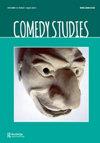It’s not funny! – On Wes Anderson’s comedy and genre hybridizations
Q1 Arts and Humanities
引用次数: 0
Abstract
Abstract Wes Anderson is, arguably, the greatest heir to the traditional American comic genre in its different manifestations. Starting with the profound influence of the masters of comedy of the silent era, Buster Keaton and Charles Chaplin, Andersonian comedy also lines up with the works of masters of classical American Comedy such as Frank Capra, George Cuckor, Ernst Lubitsch, Billy Wilder or Preston Sturges, up to the existentialist tone of some of Woody Allen’s comedies. The present contribution analyses, from the perspective of the History of Cinema, the way in which Andersonian comedy draws on this long tradition, crystalizing in the coalescence of up to five comic subtypes: deadpan humour, slapstick, screwball comedy, verbal humour and parody. The latter is of particular significance, since it is the key to the hybridization of cinematic genres that is one of the traits of Anderson’s playful and postmodern approach as a postmodern auteur. Thus, the second part of the article will explore the genre hybridizations through which the Texan filmmaker resignifies the usual meaning of traditional genre conventions, often for the purpose of achieving a very particular comic effect.一点也不好笑论韦斯·安德森的喜剧与类型的融合
可以说,韦斯·安德森是美国传统漫画流派不同表现形式的最大继承人。从无声时代喜剧大师巴斯特·基顿和查尔斯·卓别林的深刻影响开始,安德森喜剧也与弗兰克·卡普拉、乔治·布奇科、恩斯特·卢比奇、比利·怀尔德或普雷斯顿·斯特吉斯等美国古典喜剧大师的作品并驾齐驱,达到了伍迪·艾伦某些喜剧的存在主义基调。本文从电影史的角度分析了安德森喜剧如何借鉴这一悠久传统,具体表现为五种喜剧类型的结合:面无表情幽默、闹剧、怪诞喜剧、言语幽默和戏仿。后者具有特殊的意义,因为它是电影类型混合的关键,这也是安德森作为后现代导演的戏谑和后现代方法的特点之一。因此,文章的第二部分将探讨得克萨斯州电影制作人放弃传统类型惯例的通常含义的类型杂交,通常是为了达到一种非常特殊的喜剧效果。
本文章由计算机程序翻译,如有差异,请以英文原文为准。
求助全文
约1分钟内获得全文
求助全文
来源期刊

Comedy Studies
Arts and Humanities-Literature and Literary Theory
CiteScore
0.60
自引率
0.00%
发文量
26
 求助内容:
求助内容: 应助结果提醒方式:
应助结果提醒方式:


